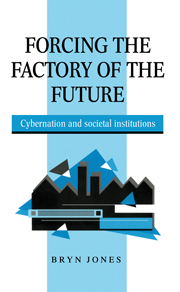Book contents
- Frontmatter
- Contents
- List of figures
- List of tables
- Acknowledgements
- List of acronyms and abbreviations
- Part I The workshop versus the factory
- Part II Technologies of control
- Overview
- 4 Technological evolution and the pathology of batch production
- 5 Numerical control, work organisation and societal institutions
- Part III Cybernation and flexibility
- Appendix: sources and methods
- Notes
- Bibliography
- Index
4 - Technological evolution and the pathology of batch production
from Part II - Technologies of control
Published online by Cambridge University Press: 06 July 2010
- Frontmatter
- Contents
- List of figures
- List of tables
- Acknowledgements
- List of acronyms and abbreviations
- Part I The workshop versus the factory
- Part II Technologies of control
- Overview
- 4 Technological evolution and the pathology of batch production
- 5 Numerical control, work organisation and societal institutions
- Part III Cybernation and flexibility
- Appendix: sources and methods
- Notes
- Bibliography
- Index
Summary
For theorists of a shift to post-Fordism, Western industrial stagnation since the early 1970s reflects a generalised ‘crisis of Fordism’ in mass manufacturing. However, from another angle, the ‘crisis’ is as plausibly viewed as one of manufacturing inefficiency in batch production, that is, sectors unable or unwilling to adopt the Fordist paradigm. This chapter and the next describe the nature and extent of the automation of batch production through the technology of numerical control (NC) and related forms of computerisation. Initially a controversial technology, NC became the spearhead for predetermining production operations through computerised data and control mechanisms. For these reduced the range of manual controls and decision-making in the operation of machine-tools. Some of this story is already well recorded. Particularly important are the detailed accounts, from contrasting viewpoints, of David Noble (Noble 1984) and Charles Sabel (Sabel 1982; Piore and Sabel 1984). The aims of this chapter are to analyse whether NC represents a continuation of Taylorism and the onset of the cybernated factory – Nobel's thesis – or, according to Sabel, a successful break with Taylorism, and the beginnings of a post-Fordist industrial system.
Writing from a labour control perspective, David Noble argues that NC was developed and diffused in North America as a result of a concerted attempt by the US military-industrial complex to deskill and control recalcitrant skilled labour. NC, he says, was promoted for use by large corporations to the detriment of more skill-dependent alternatives.
- Type
- Chapter
- Information
- Forcing the Factory of the FutureCybernation and Societal Institutions, pp. 80 - 100Publisher: Cambridge University PressPrint publication year: 1997



